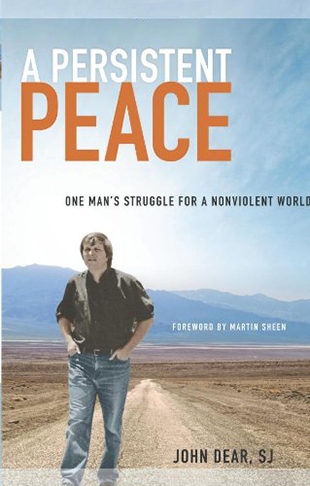John Dear is a Jesuit priest, pastor, peace activist, organizer, lecturer, retreat leader, and author/editor of 25 books on peace and justice. In this roust memoir, he traces his spiritual journey from his days as a frat boy at Duke in 1978 through his service as pastor of several parishes in northeastern New Mexico. Currently, he coordinates Pax Christi in the same state and travels widely speaking to schools and churches.
Dear reveals the reasons behind his decision to convert to Christianity and to become a zealous follower of the Prince of Peace. For him, living out the Beatitudes in a world of violence and injustice is the challenge that must be taken up by every believer. His persistent advocacy of peace has gotten him into trouble with some of his Jesuit superiors who have supported various wars. Dear agrees with Dorothy Day:
"All you have to do is compare what the Gospel asks and what war does. The Gospel asks that we feed the poor, give drink to the thirsty, clothe the naked, welcome the stranger, house the homeless, visit the prisoner and perform works of mercy. War does the opposite. It makes my neighbor hungry, thirsty, homeless, a prisoner and sick. It kills them by the millions. The Gospel asks us to take up our cross. War asks us to lay the cross on others."
Dear has been arrested more than 75 times and has spent a year of his life in prison. On December 7, 1993, he was arrested at the Seymour Johnson Air Force Base in Goldsboro, North Carolina, for hammering on a F15 nuclear fighter bomber in an attempt to "beat swords into plowshares," in light of the vision of the prophet Isaiah. Along with activist Philip Berrigan, he spent eight months in jail.
In this autobiography, Dear reveals how other advocates of nonviolence have inspired him including Mohandas Gandhi, Dr. Martin Luther King, Jr., and Daniel Berrigan. All of them would concur with the late Cesar Chavez who said: "The truest act of courage, the strongest act of being human, is to sacrifice ourselves for others in a totally nonviolent struggle for justice. To be human is to suffer for others."
Dear makes it clear that the cause of nonviolence cannot be isolated from the battle against prejudice, poverty, and injustice. He recounts his trips to El Salvador where he worked in a refuge camp; to Guatemala, Nicaragua, Haiti, the Middle East, and the Philippines; to Northern Ireland where he devoted himself to a human rights center for a year; and to Iraq where he witnessed the severe impact of the sanctions on Iraqi children. All of these experiences have given Dear a global perspective on the deadly ravages of hatred and violence. The little way of peace beckons us to open our hearts and serve others.
The author also recounts his experiences running a homeless shelter in Washington, D.C.; serving as the executive director of the Sacred Heart Center; working as the executive director of the Fellowship of Reconciliation, the largest interfaith peace organization in the United States; and serving as a coordinator of the Red Cross chaplain program after the September 11th, 2001, attacks on the World Trade Center. Dear was recently nominated for the Nobel Peace Prize by Archbishop Desmond Tutu of South Africa.
A Persistent Peace is written by a man of God who really walks his talk. Dear salutes the many peacemakers who have encouraged him on his spiritual journey. He shows the high cost of speaking the truth, resisting evil, disarming the world, and working for justice. Gandhi, one of the great souls, once said: "When the practice of nonviolence becomes universal, God will reign on earth as God does in heaven." Dear is an inspiration to us all in this Great Work.
